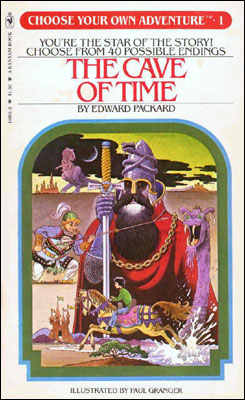When Jay from Assholes Watching Movies informed me in a comment that a movie based on the Choose Your Own Adventure books is being planned it brought back a flood of memories, including this haunting line from The Cave Of Time by Edward Packard:
You die a few years before you are born.
I was the hero of the story, and it was a poignant end to that particular adventure. It was one of several books in the Choose Your Own Adventure Series which I devoured as a kid. Because I was into all things oceanic at the time I started with R.A. Montgomery’s Journey Under The Sea, but quickly moved on to others in the series, including Space And Beyond. I also remember By Balloon To The Sahara, Your Code Name Is Jonah, and The Abominable Snowman. The only book I never really enjoyed was Who Killed Harlowe Thrombey, but then somehow a murder mystery didn’t seem right for an adventure series. The books were an amazingly simple but brilliant idea: written in the second-person, there’d be brief passages that would end with choices. Each choice had a corresponding page number. I’d wasted hours in math class because whoever had had the book the year before me, or maybe even years before that since the book was so old all the problems were in Roman numerals, but that’s another story, had written in the corner of a page, “Turn to page 317”. At page 317 there’d be a note that said, “Turn to page 128”. From page 128 I was directed to page 12, and so on, sometimes going through as many as thirty pages before finally getting to one page where they’d written, “YOUR DUMB!” That someone had actually taken this idea and turned it into a really fun series of books was amazing to me, although the inspiration didn’t really come from textbooks.
Strictly speaking it was Raymond Queneau who started the genre with his 1967 “A Story As You Like It”, but with options like, “Do you wish to hear the story of the three alert peas? If yes, go to 4; if no, go to 2” it’s not surprising the idea didn’t catch on until it was aimed at children. One night in 1969 Manhattan lawyer Edward Packard was telling his daughters a bedtime story and asked them to made decisions about how the story would go. The idea evolved into a book, The Adventure of You on Sugar Cane Island, and, with partner Ray Montgomery, Packard started writing and publishing the Choose Your Own Adventure series. Aside from making the reader the hero, though, there’s a subtle and profound message in the books: the choices you make have consequences. For kids at least part of the appeal had to be the power, the ability to make decisions that would affect the outcome of major events. There never was a simplistic moral to them, though; the decisions were often ambiguous, or morally neutral. It would have spoiled the fun if there were always clear “good” and “bad” decisions that led to either happiness or death. In fact one of the books, Inside UFO 54-40, was so memorable precisely because the best outcome, a paradise called Ultima, couldn’t be found by making decisions. I read that one at least a dozen times, going through a dozen endings, before I finally figured it out. Some of my friends would look ahead a few pages to test a decision they were about to make, but I was so enthralled that I’d follow every decision to the end and then start over again from the beginning.
On the other side of the pond British parents were concerned about the potential effects of these books. The Fighting Fantasy series was extremely popular in the early 1980’s. The publishers celebrated the 25th anniversary of the series by reissuing its first title The Warlock of Firetop Mountain in 2007. As The Times (London) reported at the time, “Critics scorned it as dumb and regressive. Child psychologists fretted that its wanton violence would derail youthful morals.” The same article adds,
It seems quaint to picture adults up in arms at a spot of imaginary orc bashing: parents today would be so grateful that their 11-year-old son was actually reading a book rather than practising Grand Theft Auto hit-and-runs, downloading porn onto his iPhone or instant-messaging death-row inmates that they wouldn’t give two hoots whether it was Fighting Fantasy or Harry Potter or The 120 Days of Sodom.
The Times article also mentions an adult “do-over” novel, Pretty Little Mistakes by Heather McElhatton, “with 150 possible ‘real-life’ endings, in which you might end up a phone sex operator or running an award-winning B&B.” I’m not surprised the idea hasn’t caught on.
I don’t remember seeing the Fighting Fantasy series but, after I’d outgrown the Choose Your Own Adventure books, a cousin introduced me to Sorcery!, a four-book series written by one of Fighting Fantasy’s co-authors Steve Jackson. It started with The Shamutanti Hills, which he gave me when he came to visit one Christmas. Sometimes offering as many as six choices, these were hardcore fantasy with roleplaying that was like solo Dungeons & Dragons. My cousin, who was a little into it breathed down my neck while I filled pages of notebook paper with my statistics and game notes, memorized the spellbook, occasionally telling me, “No, don’t do that.” When he finally left and I picked up the third book, The Seven Serpents, I was more than a little surprised to find that, with a more relaxed attitude about the rules (meaning I threw away the notebook), the books were seriously fun.
The Hollywood Reporter article about the planned movie asks, “Does it sound appealing?” and my first reaction is, holy mackerel, no, it sounds like an idea cooked up in one of the lower levels of Dante’s Inferno–itself not a great movie, but that’s another story. And strictly speaking this isn’t the first time Choose Your Own Adventure has gone to the movies. The idea of letting the audience have a say was explored in Bradbury’s Fahrenheit 451 and its movie adaptation, and in Big Tom Hanks proposes a computer-based book where a kid makes the choices. And there was a DVD version of The Abominable Snowman with the voices of William H. Macy and Frankie Muniz. And when DVDs first started coming out it seemed like every movie either had at least one “alternate ending” or a “director’s cut” version. A film that offers options–at least in the home version–doesn’t seem all that innovative. The original series even went digital years ago. Downloadable from the Choose Your Own Adventure web site, the selections were narrated by series co-founder and author R.A. Montgomery. They’re no longer available, unfortunately. and Montgomery passed away in 2014, but he said, “‘Choose Your Own Adventure’ when it came out [was] basically a computer program in a book. Maybe this is the book’s natural format.” This isn’t exactly a new idea, either. As early as 2002, one of Strong Bad’s emails featured a Choose Your Own Adventure theme. (Personally I like to “take it in a bit of a different direction”.) The Hollywood Reporter article also talks about a 1995 film “called Mr. Payback: An Interactive Movie,in which audience members could choose how the story unfolded via a joystick on their seat.” Audience interaction didn’t go over that well with 1959‘s The Tingler so I don’t know why they thought it would be better thirty-six years later. And what if the choice the rest of the audience made didn’t jive with what you wanted? Putting the choices in the hands of a smartphone app–that’s how the new film is supposed to work–doesn’t seem much better.
 Yeah, I’m old-fashioned. I go to the movies to share in someone else’s adventures, but I think choosing your own adventure is best enjoyed solo, the old-fashioned way, with paper pages that let me, if I want to, flip ahead and see how my decisions might pan out. And being in a cinema full of people tapping away at their smartphones would be too much like a virtual cousin breathing down my neck telling me, “No, don’t do that.”
Yeah, I’m old-fashioned. I go to the movies to share in someone else’s adventures, but I think choosing your own adventure is best enjoyed solo, the old-fashioned way, with paper pages that let me, if I want to, flip ahead and see how my decisions might pan out. And being in a cinema full of people tapping away at their smartphones would be too much like a virtual cousin breathing down my neck telling me, “No, don’t do that.”
Choosing my own adventure lets me be the hero; it lets me live in a world of my own, in the future, in the past, in another world, or maybe close to home, a few years before I’m born.







I loved these as a kid. I think about choices a lot – and how life can change based on what seems small at the time.
It is amazing how small choices can profoundly affect our lives, and the one area where the Choose Your Own Adventure books–all of them–fall short is that real life rarely offers us just one or two or even six choices, but a plethora, and there’s no way to go back and try a different path to see if things turn out better or worse.
I think the first time I had my hands on one of these books, I was at home recovering from pneumonia. After 2 weeks of hospitalization, I didn’t leave the house for 6 weeks and these books were my window to the world, tricking my brain into thinking I was still adventuring when in truth I was on the living room couch.
As for a movie version, I just don’t see it being satisfying. I have a feeling I’d never agree with the audience. Could it work better at home? Maybe. But probably this one is just one that shouldn’t be adapted.
Maybe it would work better at home but, as that early DVD release of The Abominable Snowman shows they did try it at home and it didn’t go over well. At least it didn’t go over well enough for them to release any more titles in any home-video format. Choose Your Own Adventure just seems best left as a book.
I choose to include a link to my son Aaron’s YouTube version of Choose Your Own Adventure, created when he was 14 years old.
I’m astounded by Aaron’s brilliance and very glad that I not only plummeted to my doom but gave a monster super powers.